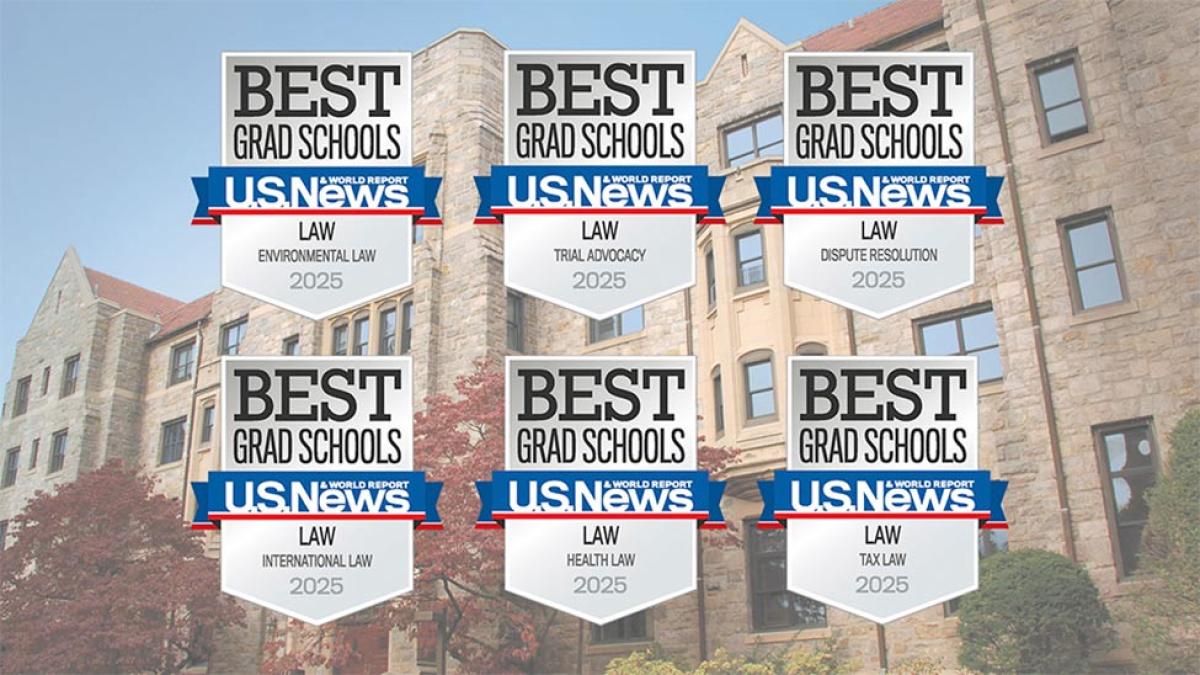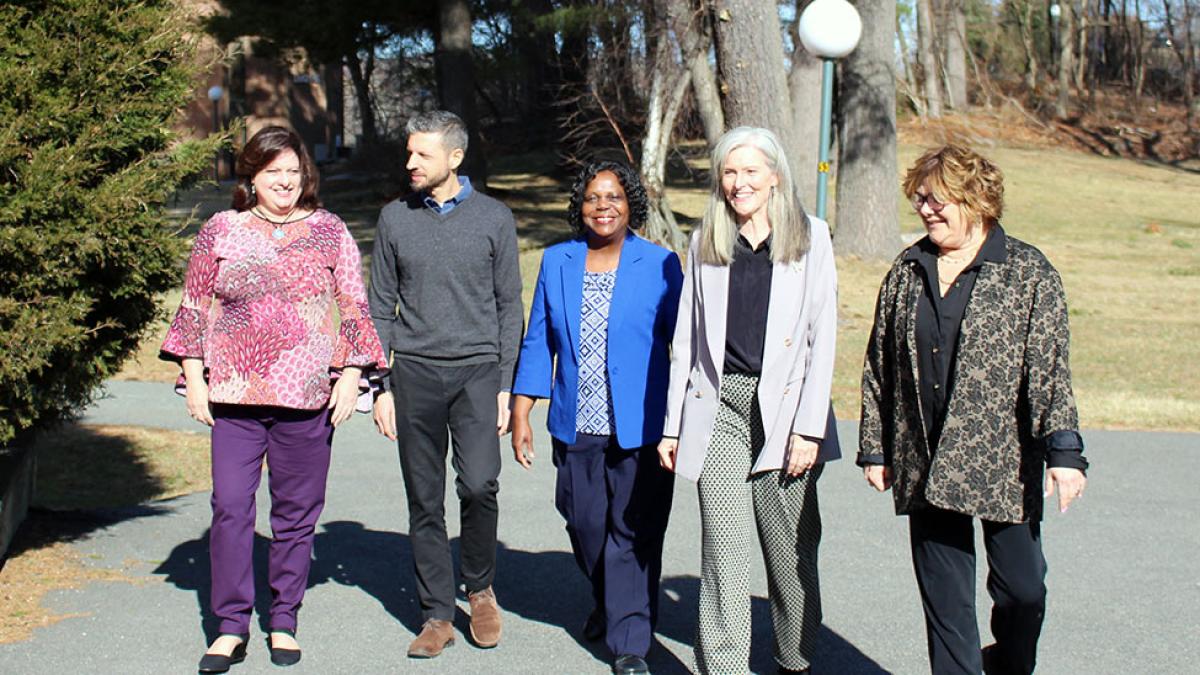Pace University’s Elisabeth Haub School of Law is once again ranked #1 in the country for Environmental Law by the latest U.S. News and World Report rankings, released today. Haub Law was also ranked #19 in the nation for its trial advocacy program as well as #18 for Dispute Resolution. Several other programs at Haub Law were recognized in the top rankings this year, including International Law, Health Law, Tax Law and the Law School's Part-Time Program.
Press Release: 25 Pace University Students Selected for United Nations Academic Impact Millennium Fellowship

Students among 5% selected for prestigious program
Twenty-five students from Pace University have been selected for the highly competitive United Nations Academic Impact-Millenium Fellowship, the University today announced.
The program received over 52,000 applications from students at 6,000 colleges and universities in 48 nations – and just 5% of those applicants were selected.
During the Fall semester, the Fellows work individually or in small groups on their chosen social impact project that advances one or more of the 17 UN Sustainable Development Goals (SDG) related to peace, justice, wellbeing, and sustainability. They will also connect with students around the world and attend enrichment sessions led by their peers and global leaders.
“Selection to the Millennium Fellowship is a tremendous honor not only for our students but for the entire Pace community,” said Marvin Krislov, president of Pace University. “These students have excelled through a rigorous, competitive process, and the Millennium Fellowship program’s commitment to advancing sustainability and leaving a global impact perfectly aligns with Pace’s mission to foster leadership and service. We proudly celebrate our students’ achievements as they work toward building a more just and sustainable future.”
Students who apply submit a proposal for a project they would like to launch on their campuses or in their communities. The Pace Fellows will be working on projects that include: the right to know what is in one’s drinking water, viewing the Ukrainian war through children’s eyes, reducing the carbon footprint of students in the residence halls, reproductive justice, addressing food insecurity for college students, and advancing human rights for refugees.
Seven of the 25 students are members of the University’s Blue CoLab, which is a group of students, faculty, and staff dedicated to advancing the right-to-know around the world what is in the water we drink. The Blue CoLab is committed to a three-step action plan that includes: petitioning the U.N. to add right-to-know water quality to SDG Goal 6; proposing an amendment to the federal Safe Drinking Water Act spurring the technological innovations that will guarantee the public’s right-to-know water quality; and developing a campus information system that will deliver timely information to the Pace community about their drinking water quality.
Isabella Coraci, a Fellow and information systems major at the Seidenberg School of Computer Science and Information Systems from Staten Island, N.Y. reflected on why advocating for safe drinking water is important to her.
“I think the issue is important because all life needs water,” she said. “We can be doing more to make sure our annual water reports are more accessible to students at Pace and eventually to students at other universities and beyond as well. I am interested in taking my technology degree and marrying that to my interest in public health and environmental health. I am interested in the technical side as well as well as the policy side.”
On being named a Millenium Fellow, Coraci added: “I think it is great to be a part of a global effort to promote the United Nation’s Sustainable Development Goals. The meetings we have had with other U.N. Millennium campuses have been great. We have been able to utilize the Millenium Network and get our project to more people.”
For Genesis Streeter, an English Literature major with a minor in Women and Gender Studies at Pace’s New York City campus who is focusing her project on reproductive justice, the Fellowship provides a sense of community.
“This is a chance to not only meet some of the most outstanding students at Pace University but to also work together to create a more equitable future for our community,” said Streeter. “I chose Reproductive Justice because as a black woman my community is often overlooked in the reproductive space whether it be in reproductive autonomy or motherhood and being able to spread awareness is extremely important.”
The Fellowship’s mission of developing leadership skills in undergraduate students who are interested in advancing the United Nations’ Sustainable Development Goals coincides with the University’s vision of helping all Pace graduates realize their full potential as innovative thinkers and active problem solvers who are uniquely trained to make positive and enduring contributions to our future world.
Pace University’s Assistant Provost for Wellness Sue Maxam said: “The UN Academic Impact-Millenium Fellowship is a truly transformative experiential learning opportunity for our students, which has a huge impact not only on them but the community at large.”
This is the fourth year that students from Pace have been selected for the Fellowship. Seven students were selected in 2021, 15 in 2022, and 30 last year, marking consistent and impressive growth in recent years.
Previous Millennium Fellows have left lasting contributions to the University and the surrounding communities. As part of the 2021 Fellowship, Alexandra Kennedy ’22, Marisa Medici ’22, and Tasfia Rahim ’23 launched Fare Trade, an initiative aimed at combatting food insecurity on campus, which has become a permanent fixture at Pace. The 25 Pace students who have been selected for the 2024 cohort are:
- Anthony Guerrero, Business Economics
- Charles Metayer, Jr., Computer Science
- Destiny Washington, Applied Psychology and Human Relation
- Ian Shimba, Computer Science
- Isabella Coraci, Information Systems
- Lizi Imedashvilli, Information Systems
- Paris Tracey, Personality and Social Psychology
- Phoenix Ellrodt, Information Technology
- Sarah Montimaire, Digital Cinema and Filmmaking
- Sebastian Roman, Information Technology
- Victor Andrade Lima, Computer Science
- Viktoriia Yevtushenko, Business Economics
- Abdulla Alsuwaidi, Finance
- Akithma Moraes, Political Science with a Minor in Business
- Anne Roy, Biochemistry
- Erika Fenty, Environmental Studies
- Genesis Nwoseh-Streeter, English Literature with a Minor in Women and Gender Studies
- Julia DeMaio, Environmental Studies and Peace and Justice Studies
- Madison Everlith, Women and Gender Studies with a Minor in Fashion Marketing
- Mikaela Regan, Global Marketing Management
- Natalie Maclay Tijerina, Peace and Justice Studies
- Patty Murrill, Communications and Media Studies
- Zain Mozai, Biology
About Pace University
Since 1906, Pace University has been transforming the lives of its diverse students—academically, professionally, and socioeconomically. With campuses in New York City and Westchester County, Pace offers bachelor, master, and doctoral degree programs to 13,600 students in its College of Health Professions, Dyson College of Arts and Sciences, Elisabeth Haub School of Law, Lubin School of Business, Sands College of Performing Arts, School of Education, and Seidenberg School of Computer Science and Information Systems.
About the Seidenberg School of Computer Science and Information Systems at Pace University:
The Seidenberg School of Computer Science and Information Systems at Pace University is a leading institute of technology education. Students experience a dynamic and expansive technology education at the undergraduate and graduate levels. One of the first comprehensive schools of computing in the nation, the Seidenberg School is strategically located in the heart of NYC’s tech scene, right on the doorstep of New York’s most promising companies. With access to established tech giants and exciting new start-ups from both the New York City and the Westchester campus, Seidenberg offers the opportunity to connect, intern with, and enjoy lucrative tech jobs following graduation. Through partnerships with leading tech firms, banks, federal agencies, and global institutions, the school’s curricula and programs are designed to ground students in the fundamentals while offering numerous hands-on experiential learning opportunity. The faculty includes numerous experts in artificial intelligence, cybersecurity, data science, game development, software engineering, and much more, who operate labs and centers providing students with practical experience and connections that lead to impressive internships and jobs.


